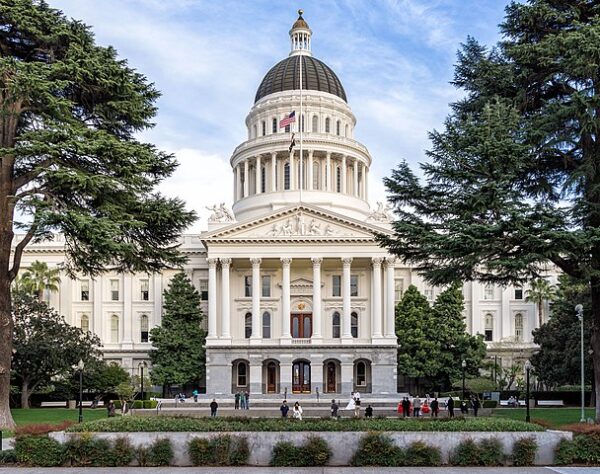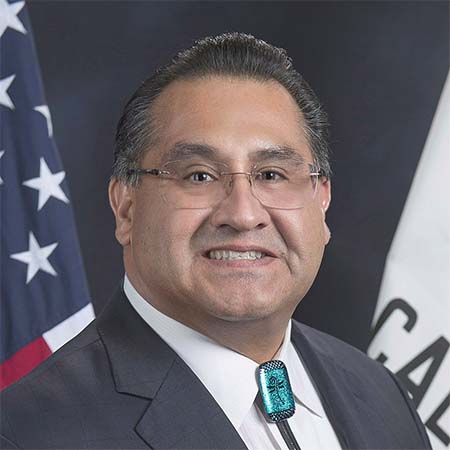
- Details
- By Alina Bykova
Assemblymember James C. Ramos (D-Highland) introduced bill AB 855 on Wednesday, which would make California Native American Day, on the fourth Friday of September, a judicial holiday.
The measure, brought forward by Assemblymember Ramos, a lifelong resident of the San Manuel Indian Reservation and the first California Native American elected to the state Legislature, swaps the paid holiday on Columbus Day for California Native American Day, Ramos’s office said.
 Assemblymember James C. Ramos, the first and only Native American serving in California’s state Legislature. Courtesy photo.All state and local court employees would receive a paid holiday in celebration of California Native American Day if the bill is approved by the Legislature and signed by Gov. Gavin Newsom.
Assemblymember James C. Ramos, the first and only Native American serving in California’s state Legislature. Courtesy photo.All state and local court employees would receive a paid holiday in celebration of California Native American Day if the bill is approved by the Legislature and signed by Gov. Gavin Newsom.
“For more than 20 years, I have worked to help create a day that recognizes the state’s first inhabitants and their history,” Ramos said in a statement. "I applaud the Judicial Council for seeking to recognize the unique role of California Native Americans. Our state has the greatest number of Native Americans residing within its boundaries, and it is fitting that we begin to expand our commemoration of this holiday.”
AB 855 would amend the Code of Civil Procedure to recognize California Native American Day as a judicial holiday so as to provide proper recognition for Native American people and celebrate their history in the state. It would not create an additional paid holiday for Judicial Council employees, but rather would exchange Columbus Day for California Native American Day. Court personnel are currently the only state workers receiving pay on Columbus Day, which falls on the second Monday of October.
The Judicial Council, which is sponsoring AB 855, voted in January to seek authority to ensure California Native American Day is designated as a judicial holiday. Ramos noted that paid judicial holidays are designated in a different code section from holidays recognized by other state agencies. Non-judicial holidays are designated in the Government Code, but court holidays are established in the Code of Civil Procedure.
“The Judicial Council of California and its chair, Chief Justice Tani Cantil-Sakauye, are committed to providing equal access and fairness in our justice system,” said Judge Marla O. Anderson, chair of the Judicial Council’s Legislation Committee. “By recognizing the importance of Native Americans we not only acknowledge our shortcomings in our state’s past treatment of them, we also celebrate their past and current contributions to our state.”
Chief Judge Abby Abinanti, Yurok tribe member and co-chair of the Tribal Court-State Court Forum, shared the following response to AB 855: “To be seen, it is a long awaited and welcomed first step by the justice system, the beginning of an effort to be inclusive of our first citizens."
Ramos said he and other people began efforts to honor California Native Americans more than 20 years ago when he was a San Bernardino County supervisor. “We were aided by then-Assemblymember Joe Baca, who successfully introduced legislation in 1998 to create a non-paid official state holiday for California’s First People. Baca went on to introduce similar legislation as a Member of Congress.”
Ramos is the only California Native American serving in the state’s Legislature.
Help us defend tribal sovereignty.
At Native News Online, our mission is rooted in telling the stories that strengthen sovereignty and uplift Indigenous voices — not just at year’s end, but every single day.
Because of your generosity last year, we were able to keep our reporters on the ground in tribal communities, at national gatherings and in the halls of Congress — covering the issues that matter most to Indian Country: sovereignty, culture, education, health and economic opportunity.
That support sustained us through a tough year in 2025. Now, as we look to the year ahead, we need your help right now to ensure warrior journalism remains strong — reporting that defends tribal sovereignty, amplifies Native truth, and holds power accountable.
 The stakes couldn't be higher. Your support keeps Native voices heard, Native stories told and Native sovereignty defended.
The stakes couldn't be higher. Your support keeps Native voices heard, Native stories told and Native sovereignty defended.
Stand with Warrior Journalism today.
Levi Rickert (Potawatomi), Editor & Publisher
